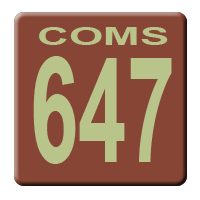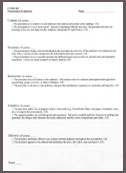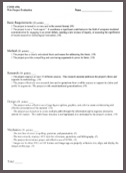Preparation
Students are responsible for reading and preparing all assigned class materials in accordance with the course calendar. Reading involves not only looking at the text but engaging the material in a thoughtful and organized fashion. Note taking, outlining, and other reading strategies are highly recommended.Course Structure
This class is not a lecture-course. It is a seminar. Therefore, the responsibility for working through the material and structuring an effective learning environment falls to each member of the seminar.Attendance
Because the environment of the course is interactive and collaborative, it is necessary that students attend and participate in every class meeting. Attendance is, therefore, mandatory. Seminar participants are permitted two (2) unexcused absences over the course of the semester. After that, the final grade will be reduced by 20 points per additional absence. This guideline is not inflexible and is subject to change due to individual circumstances. This alteration, however, must be confirmed with the instructor. When possible, this should be accomplished before the additional absence(s). In the case of any absence, it is the student's responsibility to make-up the missed work by obtaining notes from classmates or reading the assigned material. The instructor will not provide individual instruction for students who have missed a regularly scheduled class meeting.Student Assessment
Student learning and achievement is assessed by four activities: a formal presentation, four maker exercises, a research paper, and a comprehensive final examination.
Presentation Evaluation Rubric
Sign-up Procedure - A sign-up sheet will be circulated during the second class meeting. You are encouraged to browse the course calendar to decide on a presentation topic and date. It is your responsibility to remember the date of your presentation and plan accordingly. Missing your presentation will constitute failure of the assignment.
Slide Share - After your presentation, please upload your presentation slides in order to make these materials available to the seminar. Slides may be uploaded (preferably in pdf format) to the Discuss/Share" space on the course Blackboard page.
2. Maker Exercises - Students will complete four "learn-by-doing" exercises designed to provide hands-on practical knowledge of communication technology and to assist in the development of basic computer/digital media skills. These exercises will be developed, executed, and evaluated during class meetings. Students who are absent for these sessions, will need to complete the work on their own outside class and present the results to the instructor no later than 1 week after the scheduled lab session.- Code - Learn how computers are programmed and function by writing basic web applications.
- Remix - Use audio processing and editing tools to create an original digital remix.
- Chatbot - Create an interactive chatbot that can talk with you.
- Social Robot - Experiment and communicate with a socially interactive robot.
Research Paper Evaluation Rubric
The project must be delivered in both hardcopy form and as a pdf document for web distribution. The text should be prepared following the current guidelines of the American Psychological Association (APA) The projects are due on 30 April 2019 and will be formally presented to the seminar. A project proposal will be due on 20 February 2019. The proposal is an important and necessary step in the development of the project. It will provide you an opportunity to test your thesis and approach prior to committing any significant time to research and writing. The instructor will read the proposals and provide feedback and comments to assist your work. For this reason, the proposal (although not evaluated for a letter grade) is absolutely necessary.
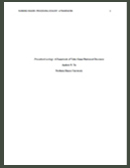
Procedural Ecology |
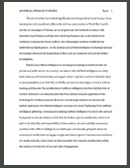
Ethical Approach to Drones |
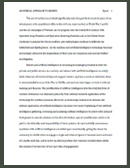
Influencing the Influencer |
4. Examination - The course will conclude with a comprehensive final examination. The examination does not require pointless memorization and/or regurgitation. Rather, it is designed to assess your knowledge of and facility with communication technology. The examination will consist of four sections.
- Talk the Talk - Define technical terms and acronyms (i.e. URL, Hypertext, ARPANET).
- It's Who You Know - Identify major figures in the field of CMC (i.e. J. C. R. Licklider, Jaron Lanier, Donna Haraway).
- Short Answers - Provide brief responses to short answer questions (i.e. The Internet has been described as a "decentralized web of heterogeneous processors." What does this phrase mean?).
- Essay - Write an essay in response to a question. This part of the exam will be written on the computer and students may use both word processing tools (spell check) and Internet resources in constructing their responses.
Questions in the first three parts will be based on course materials and our investigation of these materials in seminar discussions. They will examine your understanding of terminology, people, and basic concepts that are necessary for a working knowledge of advanced communication technologies and computer-based systems. The essay question will provoke critical reflection on or assessment of a particular issue previously discussed in seminar meetings. It will assess your ability to reflect critically on a contended issue and your skill in communicating this assessment in writing. The essay part of the exam will be written on the computer and students may use both word processing applications and Internet resources in constructing their responses.
Several days before the examination, an on-line study guide will be published. The study guide will list all elements that need to be reviewed prior to the exam. The best way to prepare for the examination is to complete the study guide. And the only way to complete the study guide is to read the course material, to attend class, and to take notes during discussion. If you read the material and participate in class discussions, you should have no problem with the examination. If you do not read the material and are consistently absent, you should expect to have considerable trouble with the examination.
Grading
- Evaluation Distribution (400 Total Points)
- Presentation = 100 points
- Exercises = 100 points (4 x 25 points per project)
- Research Paper = 100 points
- Examination = 100 points
- Grade Scale
- A = 369-400
- A- = 360-368
- B+ = 348-359
- B = 334-347
- B- = 320-333
- C+ = 307-319
- C = 280-306
- D = 240-279
- My Grades
- Blackboard Login
Policies
Classroom Conduct - This course encourages students to form, express, and defend their own ideas. In order to ensure a fair and equitable environment for the open discussion of these ideas, students agree to be respectful and civil in their interactions with each other and with the instructor. Debate and criticism will be directed to ideas and the mode of their expression and not to the individual person who articulates it.
Accessibility - Northern Illinois University is committed to providing an accessible educational environment in collaboration with the Disability Resource Center (DRC). Any student requiring an academic accommodation due to a disability should let his or her faculty member know as soon as possible. Students who need academic accommodations based on the impact of a disability will be encouraged to contact the DRC if they have not done so already. The DRC is located on the 4th floor of the Health Services Building, and can be reached at 815-753-1303 or drc@niu.edu.
Terms & Conditions - The policies, procedures, and responsibilities articulated on this website are considered binding and in full force and effect for the entire academic semester during which a student is enrolled in the course. By registering for the course, students consent to these stipulations and affirm that they have read, understood, and agree to abide by everything contained herein. Only students who officially drop the course or withdraw from the university will be considered to be released of these responsibilities prior to the recording of final grades. Additionally, exceptions to and/or alterations in the policies, procedures, and responsibilities listed on this website will only be considered in situations of extreme hardship, documented learning disability, or medical emergency. In all cases, the instructor will be considered to be the final arbiter of any request for exception.
